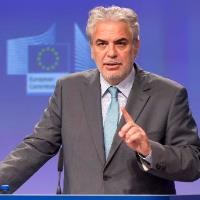(THESSALONIKI) – The European Union has stepped up funding for refugees migrants and asylum seekers in Greece, with EUR 115 million in new funding for humanitarian organisations operating in the country.
This brings total funding under the EU’s Emergency Support Instrument to EUR 198 million.
Announced the decision at the Thessaloniki International Fair on Saturday, Humanitarian Aid Commissioner Christos Stylianides said: “The new funding has the key aim to improve conditions for refugees in Greece, and make a difference ahead of the upcoming winter. Over the past months, we have significantly contributed to restore dignified living conditions through our humanitarian partners”.
The aid will focus on:
A) Improvement of existing shelters and construction of new ones in the camp facilities ahead of the upcoming winter. At the same time improvement of sanitation conditions and provision of other infrastructure such as heating.
B) Delivery of direct assistance to refugees through cash/voucher schemes. This will help refugees to cover the basic needs of their families, such as food, in a dignified manner and at the same time support the local economy.
C) Enable refugee children to access education
D) Help unaccompanied minors who are especially vulnerable and need special care and protection.
The support comes on top of the EUR 83 million the Commission provided earlier in the year to international organisations and NGOs to address the most pressing humanitarian needs in Greece, including shelter, primary health care, psycho-social support, improved hygiene conditions as well as informal education and safe spaces for children and women.
The Commission is able to fund humanitarian aid for people in need within the EU territory through the Emergency Support Instrument. Until 2018, up to EUR 700 million of EU-funding will be made available via partner organisations, such as UN agencies, the Red Cross and non-governmental organisations.
Overall, the European Union is providing over EUR 1 billion of support to Greece in tackling current migration challenges.
Further information:



